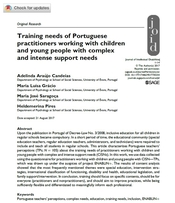Training needs of Portuguese practitioners working with children and young people with complex and intense support needs
Adelinda Araújo Candeias
Research Centre on Education and Psychology, University of Évora, Portugal
Maria Luísa Grácio
Research Centre on Education and Psychology, University of Évora, Portugal
Maria José Saragoça
University of Évora, Portugal
Heldemerina Pires
Research Centre on Education and Psychology, University of Évora, Portugal
,
SAGE
,
2017
ISBN
DOI: 10.1177/1744629517735230
Abstract
Upon the publication in Portugal of Decree-Law No. 3/2008, inclusive education for all children inregular schools became compulsory. In a short period of time, the educational community (specialeducation teachers, regular education teachers, administrators, and technicians) were required toinclude and teach all students in regular schools. This article characterizes Portuguese teachers’perceptions (TPs; N=105) about the training needs of practitioners working with children andyoung people with complex and intense support needs (CISNs). In this work, we use data collectedusing the questionnaire for practitioners working with children and young people with CISN—TPs,which was drawn up under the auspices of project ENABLINþ. The results of content analysisshowed that the most frequently mentioned themes were special education, intervention strategies,international classification of functioning, disability and health, educational legislation, andfamily support/intervention. In conclusion, training should focus on specific contents, should be foreveryone (practitioners and nonpractitioners), and should aim to improve practices, while beingsufficiently flexible and differentiated to meaningfully inform each professional.KeywordsPortuguese teachers’ perceptions, complex needs, education, training needs, inclusion, ENABLIN+







